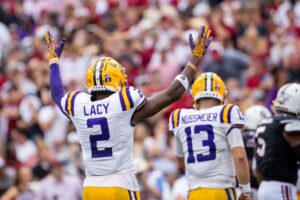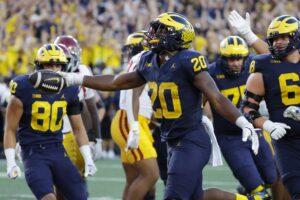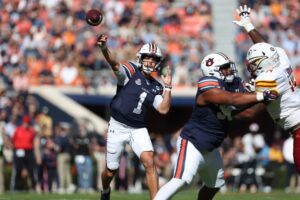No one should get caught up in the fact that UCLA is playing an Arizona team that has yet to win a game this season. All teams present hazards for UCLA right now and the Wildcats are no exception. Arizona is a danger for UCLA. Here is the the how and why.
Arizona Is A Danger For UCLA
The Wildcats have already faced a daunting schedule with losses to BYU, Oregon, and San Diego State. “We’ve done some good things, but we haven’t won enough games yet,” head coach Jedd Fisch said this week. “We recognize that we played three very, very good teams, two top-10 teams, San Diego State will end up being in that group as well.”
Arizona has out gained three of its first four opponents. The challenge has been in the red zone. “Our red zone deficiency showed up against BYU and against Oregon with turnovers,” Fisch said. “But we’re excited about where things are headed, and we believe that if we continue to be a tough, physical football team, what Arizona football is based on, made of, we’ll have a chance to have a good remaining year and many others after that.”
Leading Arizona
Arizona is coming off a bye week which has given Fisch more time to get first team reps for quarterback Jordan McCloud. At various points during the young season, the Wildcats have used Gunner Cruz, Will Plummer, and now McCloud as the starting quarterback. Each has a different upside. Clearly the offense has put up yards. What it needs is points.
McCloud has seen the least activity of the three quarterbacks. He is 27 of 42 for 300 yards. His 64% completion is second among the three signal callers. His challenge has been turnovers. He has two touchdowns to five interceptions.
UCLA head coach Chip Kelly said his defense is preparing for McCloud and not the other quarterbacks. “He is dynamic from the leg standpoint, so he can beat from running the football too,” Kelly said. He added that the key for the defense was to prepare for the multiplicity of formations and schemes that Arizona’s offense uses.
The one thing the Wildcats have not had success with is the running game. They are 113th in the country at an average of 109 yards rushing per game. That means they have a lot in common with most of UCLA’s opponents.
The Passing Defense
There was once a supposition that UCLA’s defense was shutting down opponents’ running games, thus forcing them to put up big numbers through the air. It turns out, that while UCLA’s run defense statistics and rankings are very good, so are those of everyone who has played UCLA’s opponents. Hawaii is ranked 70th in the country in rushing. LSU is 128th. Fresno State is 99th. Stanford is 106th. Four of UCLA’s five opponents are just poor running teams. Only Arizona State went into the game and came out with a viable running game. The Sun Devils rank 27th in the country in rushing. But even they relied primarily on the passing game against the Bruins. It has been the path to success for anyone playing UCLA.
The Bruins are 128th out of 130 teams in the country in passing yards allowed per game. It is no longer that they are stopping the running game of opponents and thus the passing option is what is left. It’s that the UCLA passing defense is vulnerable.
Giving Up Points
According to data provided by True Media, UCLA’s stop rate for the defense is 60%. That means opponents are scoring on 40% of their possessions against the Bruins defense. UCLA ranks 106th in the country in stop rates. For comparison’s sake, the best rated Pac-12 school is Utah at 72%. The best in the country is Georgia at 93%. Their opponents are scoring on only seven percent of their possessions.
Kelly says the ranking has a lot to do with giving up big plays. “The biggest thing for us on the defensive side of the ball has been the X-plays,” Kelly said. “That’s where I think we’re really concerned. We’ve given up too many chunk plays.” Kelly said the big yardage plays were making it easier for teams to get into scoring position against his team.
The Blitz Isn’t Working
Part of that challenge is the defensive front seven getting less and less pressure on the opposing quarterbacks as the weeks go by. They had zero sacks against Arizona State last weekend. According to linebacker Bo Calvert, what was a very aggressive, blitzing defense earlier in the season is now facing seven-man protection fronts. “They’re having more guys blocking for us,” Calvert said this week. “There was some max protection stuff where they’re having the back and two tight ends in there.” That tends to leave the defensive backs in one-on-one coverage for extended periods of time. While UCLA was applauded for having an unusually aggressive defensive game plan earlier in the season, offensive coordinators have caught on as to how to scheme against it. The next move in the chess match is up to defensive coordinator Jerry Azzinaro to come up with adjustments.
Once you have lost a conference game, the rest of the schedule becomes all the more important. The Bruins are not out of the race for the Pac-12 South title. But they no longer control their own fate. Arizona State owns the tie break between the two teams. However much the Bruins win, they need ASU to lose multiple conference games. There are still plenty of options for other bowl games. Considering the past three years, any of that would be a significant upgrade.






